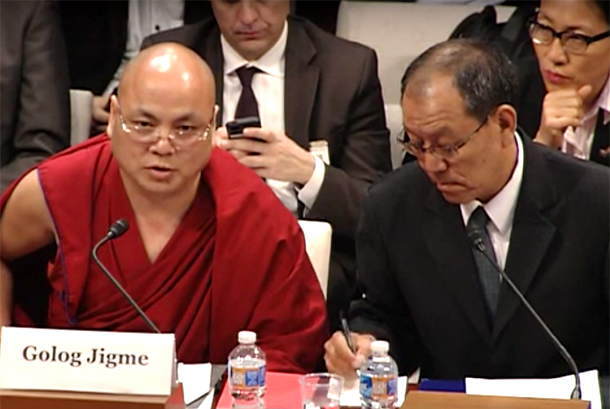 Dharamshala — The international spotlight was once again shone on the pervasive use of torture in China's criminal justice system this month when it was made the subject of a United States Congress hearing that convened on 14 April.
Dharamshala — The international spotlight was once again shone on the pervasive use of torture in China's criminal justice system this month when it was made the subject of a United States Congress hearing that convened on 14 April.
Held by the Congressional-Executive Commission on China (CECC), the hearing drew testimony from a number of high profile witnesses who each highlighted the country's systemic use of torture and maltreatment and gave recommendations to the US government.
The witnesses and experts included, Sophie Richardson, China Director of Human Rights Watch; Margaret K. Lewis, Professor of Law at Seton Hall University School of Law and Golog Jigme, a Tibetan Buddhist monk, human rights advocate, and survivor of torture in Chinese detention centers.
For the well renowned former Tibetan political prisoner Golog Jigme, this was his first appearance before the US Congress. He is well-known for highlighting the shocking torture that has become the norm in the Chinese justice system and has regularly shared his own personal story of how he suffered when he was held in detention. During the hearing he urged the US government not to turn a blind eye to the situation inside Tibet: "As human beings, we Tibetans have the right to peacefully express our views without fear of being arrested and tortured. We have the right to freedom of movement and to freedom of religion, and China should be held accountable for denying us these basic freedoms, and subjecting us to arbitrary detention and torture when we try to exercise these basic rights," he told the panel.
The congressional hearing follows a previous international hearing held by the UN's Committee Against Torture at the end of 2015. During that hearing the panel highlighted particular concern over the Chinese government's reluctance to provide information on 24 out of 26 Tibetan cases, each involving allegations of torture, deaths in custody, arbitrary detention and disappearances.
It also raised questions over allegations of deaths in custody as a result of torture or from lack of medical care. It recommended an independent investigation is held into a number of cases, including the death of Tibetan monk, Tenzin Delek Rinpoche.
Whether or not the international community will take measures to hold China to account for their actions remains to be seen. The west's relationship with China in recent years has largely been driven by economic and business interests rather than human rights and the response to injustices in Tibet has often been muted. However, since early 2015 relations between the US and China have been particularly tense following the US government's warnings to Beijing over its rapid island-building in the South China Sea, this has led to a number of heated exchanges between the two countries, including the US taking a stronger stance on China's human rights record.
Meanwhile, China recently issued a report by its Cabinet's State Council Information Office which attacked the US' human rights record. It cited gun crime and excessive use of force by police, as evidence and touched on other topics including US foreign policy. It called the country guilty of civilian deaths in Iraq and Syria through airstrikes and drone attacks, and highlighted the government's unlawful monitoring of foreign citizens' communications. "America is still committing gross violations of other countries' human rights, viewing lives in other countries as worthless," it said.
House Democratic Leader Nancy Pelosi also met with Gyatso on Tuestday April 19 and later wrote on her Facebook, saying "America has a responsibility to speak out in support of human rights in Tibet and elsewhere in China."
"A respected monk, former political prisoner, and teacher -- I was so glad to meet with him this afternoon," Pelosi said, adding "Golog Jigme Gyatso's persecution, torture and escape in Tibet bring deep insight to our efforts to advance human rights."


![Tibet has a rich history as a sovereign nation until the 1950s when it was invaded by China. [Photo: File]](/images/stories/Pics-2024/March/Tibet-Nation-1940s.jpg#joomlaImage://local-images/stories/Pics-2024/March/Tibet-Nation-1940s.jpg?width=1489&height=878)















